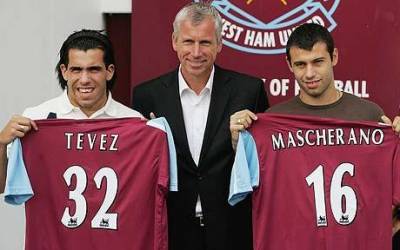FIFA are hoping that their new online Transfer Matching System (TMS) will shed some much-needed light on the dank, sh*t-strewn recesses of football’s murky underbelly i.e. the largely morality-bereft world of global transfer dealings.
Football’s governing body have revealed that TMS will become compulsory from today, meaning that there is now a solitary hub through which every single international transfer will have to be cleared – a move that they hope will, amongst other things, prevent clubs from ‘playing chicken’ with each other’s fax machines on transfer deadline day.
As things currently stand, for a transfer to go through, FIFA have to approve the accompanying paperwork. This usually amounts to a couple of reams of fax paper from both the buying and the selling clubs – this archaic method is the reason for the bi-annual clamour that accompanies the closing of every transfer window.
With TMS in place, both the clubs involved with the deal will have to submit 30 pieces of documentation relating to the player in question electronically (see below) and – crucially – if the two sets of information don’t match up, the system will not allow the transfer to be completed with FIFA then withholding clearance until the mismatch is explained so an International Transfer Certificate can be belatedly issued.
Mark Goddard, the general manager of TMS, has provided the necessary information on the systems’ operating requirements:
- For every single transfer it is mandatory for both clubs to declare that there are no ‘third party’ influences (i.e. the issue that continues to mire Carlos Tevez as he flits around the Premier League) on this transfer. That means we have an electronic record and if it appears that is not a truthful statement we can go back to the transfer in the system and remind the club or the association what they said on the record.
- More than 30 details on each transfer have to be entered, such as information on the player, club details, all payments including the amount, timing and bank details, as well as agents involved and the payments to them.
- Documentary evidence backing up the details must also be uploaded onto the system.
- The system will also keep track of individual players to ensure proper compensation payments for clubs that have trained young players but have then seen them transferred.
Such is his propensity for self-aggrandising, FIFA president Sepp Blatter has already heralded the compulsory introduction of the system as ‘revolutionary’ and ‘historic’, despite it being in use on a voluntary basis in some quarters for two calendar years now (TMS was rolled out as ‘test scheme’ in 18 countries in 2008).

Stamping out the majority of deadline day brinksmanship (the system automatically shuts down as soon as the transfer deadline passes, thus preventing any further action from taking place) is, in itself, a sufficiently noteworthy application, but FIFA seem hopeful that TMS may serve to also provide the global game with a much more worthy service.
Due to the fact that a transfer won’t be deemed to have been officially ‘rubber-stamped’ without being processed by TMS, FIFA believe that, because all international transfers will have to go through the new initiative, the prevention of money laundering and the protection of young, aspirational and vulnerable players will manifest as prominent by-products.
Taken from FIFA’s press release;
“When it comes to young and minor players, TMS also has a vital role to play. By keeping track of individual player histories, the system can be used to ensure that proper compensation payments can be calculated for clubs that have trained young players but have then seen them leave for other clubs.”
Whether it will or won’t combat the aforementioned issues is matter that only linear time can address but, at the very least, TMS will provide an ‘electronic paper trail’ (if such a thing can exist) of who went where and for how much – which can only be considered a boon, no matter how minor.
I suppose the fact an organisation like FIFA, which is repeatedly resistant to progression, has made even the smallest shift toward tackling one of the most deeply-rooted cancers in the professional game should render us grateful.
The sheer number of agents and brokers involved in even the most inconsequential of transfer dealings these days can bewildering. At the very least you can expect to find three intermediaries (a representative apiece for the buying and selling clubs, plus one for the player himself) working on any deal – all toiling away for their slice of the prospective pie.
However, deals as formulaic as this are only the tip of the dog-turd. The world of transfer negotiations is rife with the kind of tapping-up (amounting to kidnap on many occasions), back-slapping bribery and rampant scheisterism that can only be fully combated with total (i.e. public) transparency – let everybody know what everybody stands to win or lose – but I don’t think for a minute we’ll ever see that day come in professional football.
Too many people of ‘nefarious influence’ have a vested interest in the status quo and, to borrow a fitting quote from the great Gab Marcotti, turkey’s don’t vote for Christmas.
Add Sportslens to your Google News Feed!






